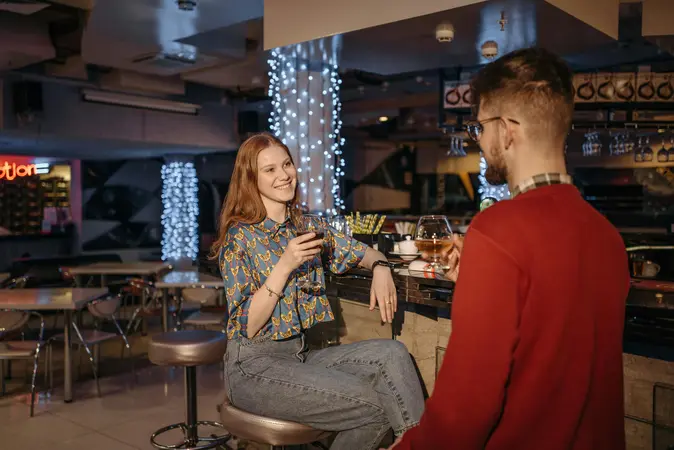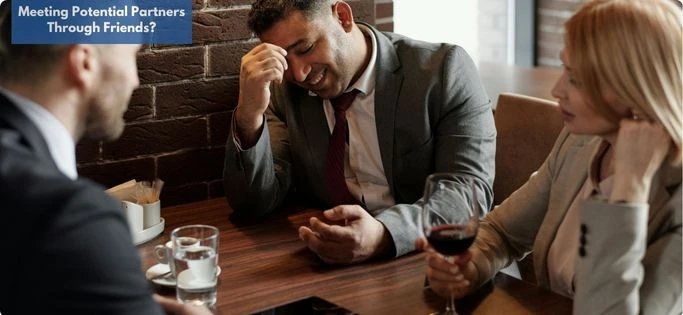Meeting potential partners through friends is the perfect, smart, and safest predictable bet to start a romantic connection. Although it often comes with its own challenges if you’re not careful. I’ve seen this go both ways; while some connections turned into lifelong relationships, others created tension that spilled over into friendships. If you’re thinking of going this route, let me help you avoid common mistakes that could ruin both the chance at love and your friendships.
When I met a potential spouse through a friend years ago, I made some missteps that cost me the connection. That taught me valuable lessons I wish I’d known earlier. Let’s go through the things you’ll want to avoid so you can make the most of meeting potential partners through friends without putting anyone in an awkward spot.
This advice fits perfectly whether you’re in a city like New York, in the U.S., or a city like Mumbai in India, or Islamabad in Pakistan, a developing country.
It’s easy to get carried away with excitement when your friend offers to introduce you. But trust me, taking a thoughtful, respectful approach makes all the difference. The tips I will share in this guide will help you through what not to do, so you can focus on building something real without hurting the friends who act as the natural bridge that sets the stage.
Whether you’re newly single or giving dating another shot, I’m here to guide you through what to avoid so you can keep things positive, respectful, and full of possibility. If you want to go deeper into preparing for meeting someone new, I strongly suggest reading 11 Must-Ask Questions Before Meeting Potential Partners (Build Better Connections).
Key Takeaways
- Respect your friend’s role and avoid dragging them into issues
- Don’t overshare about the relationship with mutual friends
- Set expectations early to avoid disappointment
- Keep group dynamics separate from personal dating efforts
Meeting Potential Partners Through Friends Meaning
Meeting potential partners through friends is the simple act of being introduced to someone new by a mutual acquaintance. Instead of meeting on an app or out at a bar, a person you trust is connecting you with someone they know and think you might like. Think of your friend as a personal, walking, talking introduction service.
This method works on a foundation of trust. The idea is that your friend knows your personality and also knows the other person, so they can see a potential compatibility that you might not find on your own.
Few things you should consider:
- A Trusted Source: Your friend acts as a character reference for both of you.
- A Warm Introduction: The arrangement is often less formal and can happen at a group dinner, a party, or a planned one-on-one meeting.
- Built-in Common Ground: You automatically share a connection through your friend, which provides an easy starting point for conversation.
- Potential for Awkwardness: There is a downside. If you don’t feel a connection, you have to figure out how to say “no thanks” without making things strange for the friend who connected you.
Assuming They’re Already Interested Just Because You Share a Friend
Just because your friend says, “You two would get along,” doesn’t mean they’re into you. One of the biggest traps people fall into is assuming the matchmaking guarantees mutual attraction. It doesn’t. I’ve seen situations where one person expected instant chemistry, while the other simply agreed to a casual hangout.
Instead of going in with high expectations, treat the first meetup like any other introduction. Be polite, be open, but don’t make assumptions. That way, you give both of you room to figure things out without pressure. It also saves you from feeling disappointed or awkward if the interest isn’t mutual.
To make it smoother, ask your friend for more context: “Have they said they’re looking to date?” or “Do they even know it’s a setup?” These questions help manage expectations and avoid misreading the vibe from the start.

Don’t Turn Your Friend into Your Relationship Manager
When you’re meeting potential partners through friends, it’s easy to blur the lines and expect too much from the friend who introduced you. I’ve seen people pressure friends to play matchmaker, counselor, and go-between, and it rarely ends well.
Here’s how you can avoid making this mistake:
- After the introduction, take responsibility for building the connection yourself.
- Don’t ask your friend to relay messages or feelings between you and the person.
- Avoid dragging your friend into disputes, misunderstandings, or vent sessions.
Once you’re introduced, it’s your responsibility to keep the communication going, or not. Don’t make your mutual friend your go-between. I’ve seen people constantly ask their friends, “Did they say anything about me?” or “Can you check if they’re still interested?” It puts pressure on your friend and drags them into something that should be between two adults.
Instead, I would suggest, you:
- Get their number directly (with consent)
- Keep communication between you and them
- Only involve your friend again if both parties feel stuck or confused
This approach keeps things clean and prevents unnecessary drama. It also gives your potential partner a chance to decide for themselves, without outside pressure.
Getting Too Comfortable Too Soon Just Because a Friend Set You Up
I’ve seen people let their guard down too quickly just because they think the match makes things safer. They talk about past breakups, finances, or even family issues too early on. Don’t confuse trust-by-association with actual connection. Just because you have mutual friends doesn’t mean the emotional safety is automatic.
The early stages still require boundaries. Get to know the person. Learn their values, habits, and lifestyle choices. Don’t skip the process. Here’s a helpful resource on signs you’re being love-bombed or emotionally rushed.
This is where I often send people back to my main guide, 11 Must-Ask Questions Before Meeting Potential Partners (Build Better Connections). Those questions help you figure out if you’re on the same page before emotions get involved.
Avoid Oversharing with Your Friend About Every Detail
I’ve been guilty of this myself. After a date, I felt tempted to give my friend a play-by-play, but it only made things uncomfortable. Friends don’t want to hear about every awkward silence or every little spark. It puts them in a tough spot.
If you want to make things go well with all the parties involved, it is best to:
- Keep private matters private, especially anything intimate or sensitive.
- If you seek advice, keep it high-level and don’t force your friend to take sides.
- Be mindful that oversharing can affect group dynamics down the line.
Don’t Rely Too Long on Group Hangouts
Group settings are common in a culture like the U.S. when friends introduce potential partners, like group hikes, game nights, or barbecues. While these can be a comfortable starting point, staying in the group phase too long can block deeper connection.
- After the first group event, suggest a simple one-on-one meet-up, like coffee at Starbucks or lunch at Panera.
- Don’t let group opinions guide your decisions about the relationship.
- Focus on your personal connection outside of the group setting.

Avoid Unrealistic Expectations When Meeting Potential Partners Through Friends
This is a classic matchmaking mistake. Your friend means well, but they describe their single friend as a mix of a superhero, a genius, and a celebrity chef. They build this person up so much that the real human could never match the expectation. This is the fastest way to create pressure and set the stage for disappointment.
To avoid an unrealistic dating rollercoaster, you should:
- Politely lower the stakes. Say something like, “They sound great! I’m just looking forward to meeting someone new and having a good conversation.”
- Focus on shared interests. Ask your friend questions like, “What do you think we’d enjoy talking about?” instead of “Are they ‘The One’?”
- Keep it light. The goal is to meet a person, not a résumé. The less pressure, the more natural the interaction will be.
Don’t Fake a Connection When Meeting Potential Partners Through Friends
Don’t Fake Chemistry to Protect Your Friend’s Feelings
It happens. Chemistry is a funny thing, and you can’t force it, no matter how great someone seems outwardly or how much your friend likes them. The worst thing you can do is to fake it, either during the date or afterward. This leads to more awkwardness, wastes the other person’s time, and can even hurt their feelings when the truth eventually comes out.
You have to be prepared for this possibility. Before you even agree to the arrangement, it’s smart to get a clear picture of who you’re meeting. A great way to prepare is by thinking through some must-ask questions before meeting potential partners, which can help you build a better connection if there is a spark, and be respectful if there isn’t. Honesty, delivered kindly, is always the best approach.
Being direct without being unkind is a skill. You can tell your friend, ‘They were really nice, but I just didn’t feel a romantic connection.” A good friend will understand. Don’t go on a second date; you don’t want just to avoid a slightly uncomfortable conversation.

Don’t Be Unclear or Ghost Them if It’s Not a Match
This is the part everyone worries about, but disappearing is the worst possible response. Ghosting is not only hurtful to the person you met, but it also puts your friend in an incredibly awkward position. They are left to answer for your silence, which can damage your friendship. The key is being direct yet kind in your communication.
- Tell your friend first. Before you do anything else, give your friend the update within a day. Don’t leave them in the dark to fill in the confusing texts.
- Be appreciative but direct. Thank your friend for the introduction. Say, “Thanks so much for setting that up. I had a nice time, but I don’t think we’re a match.”
- Decline politely if they ask you out again. If the person contacts you for another date, respond. A simple, “It was great to meet you, but I didn’t feel we had a romantic connection. I wish you the best!” is all that’s needed.
- Reassure your friend. End with, “I really appreciate you thinking of me, and I hope this isn’t weird for you. Our friendship is what’s most important.”
Don’t Make the Whole Date About Your Mutual Friend
It’s easy to fall into the trap of using your mutual friend as a crutch for conversation. While it’s a natural starting point, spending the whole time talking about your friend sends a few bad signals. It can make it seem like you’re not interested in your date as an individual. Or, it can feel like you’re gathering information to report back to your friend.
- Move on quickly: Acknowledge your shared connection, have a laugh about how you met, and then move on to a new topic. Ask them about their work, their hobbies, or what they did last weekend.
- Be genuinely curious: The point of a date is to get to know the other person. Show them you’re interested in them, not just in their connection to your social circle.
Letting It Get Weird in the Friendship Group
This is a big one. If things don’t work out romantically, how do you handle being around each other? You’ll likely still see them at birthday parties, church events, or game nights. That’s why it’s smart to be mature from the start.
Agree early on, if it doesn’t go anywhere, there’s no drama. Don’t ghost them or gossip about what happened. Be adults about it. That protects your group dynamic and helps everyone stay comfortable.
You can also read this helpful New York Times guide on protecting friendships while dating someone new.
How to Meet a Partner in Your 40s
Dating in your 40s often means you’re bringing more life experience and self-awareness to the table, which is a great advantage.
Meeting Potential Partners in Your 40s
Meeting potential partners in your 40s means you know who you are and what you want. The challenge is often just finding the time and the right places to meet like-minded people.
- Re-engage Your Social Circle: Let your friends know you’re open to dating. People in your circle are one of the best sources for quality introductions. A casual “Hey, if you know anyone you think I’d get along with, I’m open to being introduced” can work wonders.
- Use Dating Apps Wisely: Your time is valuable. Opt for apps that attract people looking for more serious relationships, like Hinge or Bumble. Be clear and honest in your profile about what you’re looking for to attract the right kind of person.
- Get Involved in Community Activities: Think about what you enjoy. This could be anything from joining a running club, taking a weekend workshop, or getting involved in a local community project. You’ll meet people with shared interests in a natural, low-pressure way.
- Attend Professional Events: Use your career network. Industry conferences, workshops, or even local business association meetups are filled with interesting, established people.
How to Meet a Partner in Your 50s
Finding a partner in your 50s can be an incredibly rewarding experience. At this stage, people are often more settled, emotionally mature, and looking for genuine companionship. The dating world may have changed since you were last in it, but the principles of connection are the same.
- Prioritize Social Gatherings: Make an effort to accept invitations to parties, dinners, and other social events from friends and family. These are warm, relaxed environments to meet new people who are already connected to your circle.
- Explore Niche Hobbies: What have you always wanted to do? Join a wine-tasting club, a dance class, a book club, or a hiking group. These activities attract people with similar passions and give you something fun to focus on, with meeting someone being a welcome bonus.
- Try Dating Sites for a Mature Audience: There are platforms designed specifically for people in your age range, such as SilverSingles or OurTime. These sites have a user base that shares similar life experiences, making it easier to find a compatible match.
- Travel with a Group: If you enjoy traveling, consider a group tour. It’s a fantastic way to see a new part of the world while sharing an experience with other single, adventurous people in your age group.

Final Thoughts on Meeting Potential Partners Through Friends
With all that said, meeting potential partners through friends can work well if you avoid common mistakes. It may feel safer because of the shared connection, but it still takes effort, honesty, and maturity to build something meaningful. Misreading signals or leaning too hard on the mutual connection can create unnecessary tension.
Take your time and approach the arrangement like you would any other meeting, with curiosity, but also boundaries. This allows space for something real to grow, without wrecking your friendships in the process. Keep expectations realistic and always prioritize open communication.
If you’re serious about making a genuine connection, don’t miss the chance to prepare better. Read my full guide: (11 Must-Ask Questions Before Meeting Potential Partners (Build Better Connections). It will help you move from guesswork to clarity and make sure you’re not wasting emotional energy on mismatched intentions.
Frequently Asked Questions
Is it a good idea to meet someone through a friend?
Yes, if handled with maturity. Shared connections can help, but don’t assume compatibility.
What should I ask my friend before the introduction?
Ask if the person is actively looking to date and knows it’s a matchmaker.
Should I follow up with the friend after the first date?
No. Keep communication between you and the person you’re dating.
How do I keep things from getting awkward in my friend group?
Agree early on to keep it respectful if things don’t work out.
Is it okay to say no after the introduction?
Yes. Be kind but honest if you’re not feeling a connection.
What if I like them more than they like me?
Manage your expectations early and communicate directly.
How do I know if we’re compatible?
Use questions that uncover values and life goals. Don’t rely on surface-level traits.
Can I ask mutual friends for advice during the relationship?
Only if both of you are comfortable with it. Avoid dragging others into private matters.
What if they tell others in the group personal things I shared?
That’s a red flag. Address it directly and consider whether they respect boundaries.
Is it better than online dating?
It depends on the people involved. Both have pros and cons.











Thank you for sharing with us, I think this website truly stands out : D.